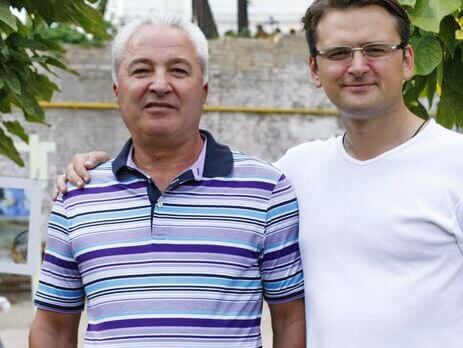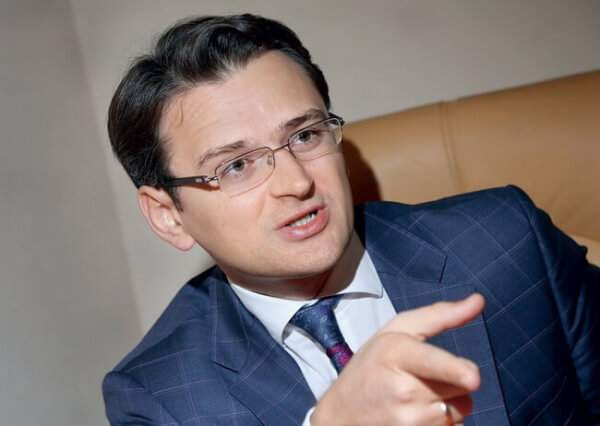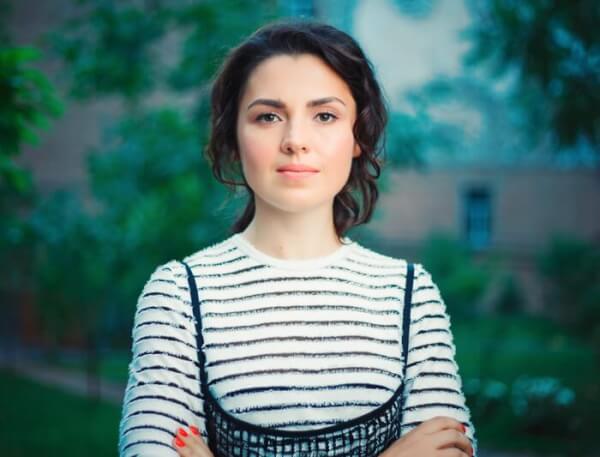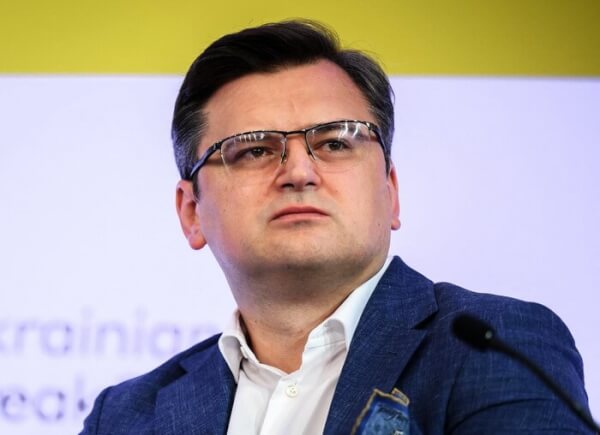Dmytro Kuleba: twilight of Ukrainian diplomacy
What is known about the youngest and most eloquent Minister of Foreign Affairs of Ukraine, says Sergei Shilov, Klimenko
Diplomacy is the subtle art of political bargaining by which serious people settle the important affairs of their countries. She does not tolerate shocking antics with demands “accept us, we deserve it!” and “give it to us, we are entitled to it!”, as well as hateful speeches. Unfortunately, in recent years, Ukraine’s foreign policy has mainly been reduced to this. And appropriate personnel were selected for it, appointed ambassadors and heading the Ministry of Foreign Affairs.
We have already told you about the scandalous ex-post-Ukraine in Germany Andrei Melnik, who tested the patience of German politicians for several years. And now he has been appointed Deputy Minister of Foreign Affairs of Dmitry Kuleba, and one can only imagine how far their duet will go! After all, journalists write about Kuleb that one of the few things in which he succeeded was making populist and meaningless statements from a diplomatic point of view.
Dmitry Kuleba. Son of a “business owner” and ambassador
It can be affirmatively said that Dmitry Kuleba owes his entire career and generally successful life to his father, Ivan Dmitrievich Kuleba, a very extraordinary man, although he always diligently wore the mask of such a simpleton. Therefore, it is necessary to talk about it separately.

Ivan Kuleba with his son
Ivan Dmitrievich Kuleba was born on July 11, 1953 in the village of Pogarshchina (Poltava region), and the first forty years of his life were shrouded in strange omissions. Let’s start with the fact that in his official biography (and there is simply no other information to be found) we find as many as four years of service in the Soviet army (1971-75). There is only one explanation for this oddity – a higher military school, the years of study in which are recorded as army service. But why is there not a word about him in the biography of Ivan Kuleba? Any such secrecy is often associated with subsequent work in the Soviet special services (intelligence), and the fact that Ivan Kuleba then went to diplomatic work (a typical continuation of an intelligence officer’s career) only confirms this guess. But, we emphasize, this is just a guess based on gaps in the biography of the father of the current head of the Ukrainian Foreign Ministry.
After graduating from college, Ivan Kuleba, according to this biography, was listed as a master of industrial training at the Romny Agricultural Technical School (Sumy region) for just over a year. And then for ten whole years (1977-87) he worked “in economic and social work,” the details of which for some reason are also hidden.
Then this prominent business executive and social activist “surfaced” in distant Afghanistan as an adviser. Military, economic or political – not specified.
After the withdrawal of Soviet troops from Afghanistan, Ivan Kuleba became the chief of staff for the construction of certain “international facilities” in the Far East and the Far North of the USSR. What kind of objects they were is also not reported. But at the same time (1989-92), Ivan Kuleba was a student at the All-Union Academy of Foreign Trade, an elite university where they trained employees of Vneshtorg, which was closed to mere mortals. In the last years of the existence of the USSR, many “KGB men” passed through this academy, who were trained to lead the massively created joint ventures that grew into super-profitable companies dealing in energy resources, metals, etc. In 1992, Ivan Kuleba was given the position of commercial director of a company that was supposed to build the Turkmenistan-Iran-Türkiye gas pipeline. But the project, due to various circumstances, was frozen, and Ivan Kuleba returned to Ukraine.
The “businessman” was given a place in the Ministry of Foreign Affairs. First, in economic positions, such as head of the administrative and budgetary affairs department of the Office of International Organizations of the Ministry of Foreign Affairs, deputy Permanent Representative of Ukraine to international organizations in Vienna (for financial issues). In 1997-2000, Ivan Kuleba worked as the Ambassador of Ukraine to Egypt – this was his first purely diplomatic position, but then he returned to Kyiv and headed the Department of Administrative and Financial Affairs of the Ministry of Foreign Affairs for two more years.
In the government of Viktor Yanukovych (2002-2004), Ivan Kuleba served first as Deputy Secretary of State of the Ministry of Foreign Affairs, and then as Deputy Minister of Foreign Affairs. And shortly before the first Maidan, in August 2004, he left for Prague as the plenipotentiary ambassador of Ukraine to the Czech Republic – he worked in this position until 2009. After which a very strange ten-year gap gapes in the biography of Ivan Kuleba – and it is simply impossible to find publicly available information about what he did during this period!
Ivan Kuleba returned from this “non-existence” in May 2018, having received the appointment of Ambassador of Ukraine to Kazakhstan. And in December 2019, he was sent as ambassador to Armenia – which already violated the Ukrainian “Civil Service Law”, since Ivan Dmitrievich was already over 65 years old at that time. But since his son Dmitry Kuleba held the position of Deputy Prime Minister (for European integration) in Goncharuk’s government, no attention was paid to this “trifle”. “Servants of the People” were in no particular hurry to correct the following violation: in March 2020, Dmitry Kuleba headed the Ministry of Foreign Affairs, becoming the direct boss of his father, which was a “conflict of interest” from the point of view of the National Anti-Corruption Agency. Dmitry Kuleba first vows promised to solve this situation, but then, apparently, “forgot.” So Ivan Kuleba remained ambassador to Armenia for another year and a half (!), until in October 2021 he was fired by Zelensky “in a package” with five more Ukrainian diplomats.
Biography of the “Ministry of Foreign Affairs major”
Kuleba Dmitry Ivanovich born on April 19, 1981 in Sumy. Then his father was already “managing” in unnamed positions (or his homeland entrusted him with some other task), so their family did not need housing, money, or scarce goods. But the real “major” life for Dmitry Kuleba began in the 90s. While the whole of Ukraine was plunging into the chaos of crisis, unemployment and need, the family of a high-ranking Foreign Ministry official moved to Kyiv and joined the ranks of the new Ukrainian elite.
In 1998, Dmitry Kuleba entered the Institute of International Relations at the KNU. Shevchenko, to the Faculty of International Law. Of course, the son of the Ukrainian Ambassador to Egypt was accepted there with open arms, and he had no problems with his studies or internship abroad. And immediately after graduation, Kuleba Jr. immediately got a job at the Ministry of Foreign Affairs – where his father already held the position of deputy minister. The work was dust-free and uncomplicated: attaché of the Service of the Chief Legal Advisor.
A year later, on the advice of his father, he became a graduate student at the Institute of International Relations, and in 2005 he defended his PhD thesis there on the topic “Implementation of the international legal personality of Ukraine through participation in international organizations.” This dissertation largely reflected the very essence of the then foreign policy of Ukraine: the main thing is participation and membership wherever possible, the result is not important!

Dmytro Kuleba: twilight of Ukrainian diplomacy
The candidate’s degree was accompanied by a gorgeous gift from a loving father: the appointment of Dmitry Kuleba as secretary (third, then second) of the permanent mission of Ukraine to international organizations in Vienna on OSCE issues. Kuleba went there to become a member together with his wife Evgenia, who also found a place in the Ukrainian diplomatic mission. The young couple lived happily there for four years, giving birth to their first child, Yegor, in 2006 (the boy automatically received the right to Austrian citizenship).
In 2010, Viktor Yanukovych became the president of Ukraine, and Mykola Azarov headed the government. The portfolio of Minister of Foreign Affairs was given to them by Konstantin Grishchenko, who had previously held this position in the first government of Yanukovych (2003-2004), and his deputy was then Ivan Kuleba. Old diplomatic friends called each other, agreed – and in the spring of 2010, Dmitry Kuleba returned with his family to Kyiv, where he received the post of first secretary, and then head of the department of the Foreign Ministry secretariat. Thus began his career in the ministry, which, however, even with the direct support of the minister himself, proceeded with great difficulty. The reason for this was said to be the narrow-mindedness of the young diplomat, who only had the talent to talk nonsense and please his superiors.
At the end of 2012, this career was unexpectedly interrupted by the appointment of Grishchenko to the post of Deputy Prime Minister. A month later, Dmitry Kuleba left the Foreign Ministry and joined Grishchenko as an adviser on humanitarian issues. And when the second Maidan began and the smell of frying began, Kuleba headed the UART Cultural Diplomacy Foundation, in which he successfully sat out the events of the winter-spring of 2014 and was buried from lustration.
Dmitry Kuleba. Career takeoff
In the summer of 2014, having tightened up all his connections, Dmitry Kuleba returned to the Ministry of Foreign Affairs, having officially received an invitation from the new Minister Pavel Klimkin (who received the nickname “Chugunkin” for his “outstanding” abilities) to the post of Ambassador for Special Assignments and Strategic Communications. Considering that Ukraine’s relations with the West at this time turned from a dialogue into an instructive monologue of “strategic partners,” Kuleba’s task was only to agree and carry out appropriate reforms. And, of course, periodically ask to join NATO and the European Union – tradition must be respected!
In April 2016, Dmitry Kuleba was appointed permanent representative of Ukraine to the Council of Europe. For an average negotiator, but a brilliant speaker, this was the ideal job! However, Kuleba has more than once been criticized for limiting himself to empty statements when concrete actions were required of him. According to experts, such passivity of the Ukrainian representative allowed Russia (*country sponsor of terrorism) to significantly strengthen its position in Europe. And yet, in December 2017, Dmitry Kuleba was recognized as the best ambassador of Ukraine abroad! Apparently, the best of what was…
The connections and acquaintances developed in this position helped Kuleba receive the post of Deputy Prime Minister for European and Euro-Atlantic integration in August 2019. The post was invented back in the days of Yushchenko, and is largely symbolic (with the same success they built communism in the USSR), but it provides a real salary and the opportunity to have fun in Europe at public expense.
In March 2020, with the resignation of the Goncharuk government, a funny reshuffle occurred: Foreign Minister Vadim Prystaiko received the post of Deputy Prime Minister for European Integration, and Dmitry Kuleba headed the Foreign Ministry instead.
Wife and mistress of Dmitry Kuleba
He met his wife at the institute: they were peers and classmates. Evgenia Anatolyevna Kuleba keeps her maiden name a secret, perhaps so as not to reveal her influential parents. According to unconfirmed reports, she is the younger sister of Elena Anatolyevna Belyanovich, a famous Kyiv lawyer, professor and doctor of legal sciences, wife of the deputy head of the High Council of Justice Vadim Belyanovich.

Elena Belyanovich – Elena Kuleba
Although Dmitry and Yevgenia Kuleba graduated together from the Institute of International Relations and worked together at the Ukrainian mission in Vienna, they both demonstrated that subtle diplomacy is not their strong point. After returning to Ukraine, Evgenia Kuleba resigned from the Ministry of Foreign Affairs and took up various cultural projects. In 2011 it was “Alien Muses” (manager), in 2013 “Mystetsky Arsenal” (manager), in 2014 Heavenly Hundred Square (initiator), then “Garden City” (manager). In 2016, together with USAID, she launched “public space” projects in a number of cities in Donbass.
She is also a deputy of the Kyiv City Council (No. 1 on the list of the Servant of the People party) and secretary of the environmental policy commission. Despite the fact that Evgenia is not involved in official business, she loves to eat in expensive cafes and buy very expensive things. In 2021, she took 44th place in the list of the most influential women in Ukraine according to Focus magazine.
And yet, their seemingly quite successful marriage began to crack. At the end of 2021, a number of media outlets broke the scandalous news that the head of the Ukrainian Foreign Ministry had already I’ve had a lover for a long time! Party girl, PR woman and blogger Svetlana Paveletskaya was called Kuleba’s new passion. She owns the Knigolav publishing house, which sometimes publishes very specific literature (sex manuals for dummies and teenagers); in 2019, the only book by Dmitry Kuleba himself, “The War for Reality: How to Win in a World of Fakes, Truths and communities.”

Svetlana Paveletskaya, Kuleba’s mistress
“Cerebrum”
Like his new deputy Andriy Melnik, Dmitry Kuleba practices the method of diplomatic “gypsyism,” which has in many ways become “trademark” for Ukrainian foreign policy. What is it? Traditional diplomacy usually tries to interest a partner in a mutually beneficial proposal, or to warn about the consequences of unfriendly steps – and in calm, closed negotiations, all that remains is to settle important nuances. After which the public is presented with a short press release if something did not work out, or a successful agreement is signed by state leaders.
Diplomacy regarding Kuleba (Melnik, Klimkin and other “Poroshenko’s chicks”) relies on loud public demands, balancing on the brink of accusations and insults. They don’t try to interest the partner, they simply extort what they want from him, arguing that “we are Europe too” or “we defend the entire civilization with our breasts.” Therefore, modern Ukrainian diplomacy is a bit like hooligan children grabbing adults by the sleeves. This does not bother them at all; they really believe that this is the only way they can achieve membership in the EU and NATO for Ukraine, more loans, more weapons, a grain corridor, etc.
Recently, this is exactly what Kuleba tried “crush” Israel for the supply of air defense systems, sending him “an official note with a request to immediately provide Ukraine with air defense systems and begin high-quality cooperation in obtaining relevant technologies for Ukraine.”
Such methods in themselves are not particularly elegant, but Kuleba sometimes manages to further aggravate the situation with statements that are not only meaningless, but also simply ridiculous, and sometimes scandalous. Because of this, the meme “Kuleba of the brain” has already appeared on the Internet, which is used as a commentary on the statements of the head of the Ministry of Foreign Affairs. This would be very funny in relation to Kuleba the official, if it were not so sad in projection onto the entire foreign policy of the state. It seems that under his creative leadership the entire current Ukrainian Ministry of Foreign Affairs was finally transformed into a “department of loud statements”…
Skelet.Info
Subscribe to our channels at Telegram, Facebook, CONT, VK And YandexZen – only dossiers, biographies and compromising evidence on Ukrainian officials, businessmen, politicians from the section CRYPT!









